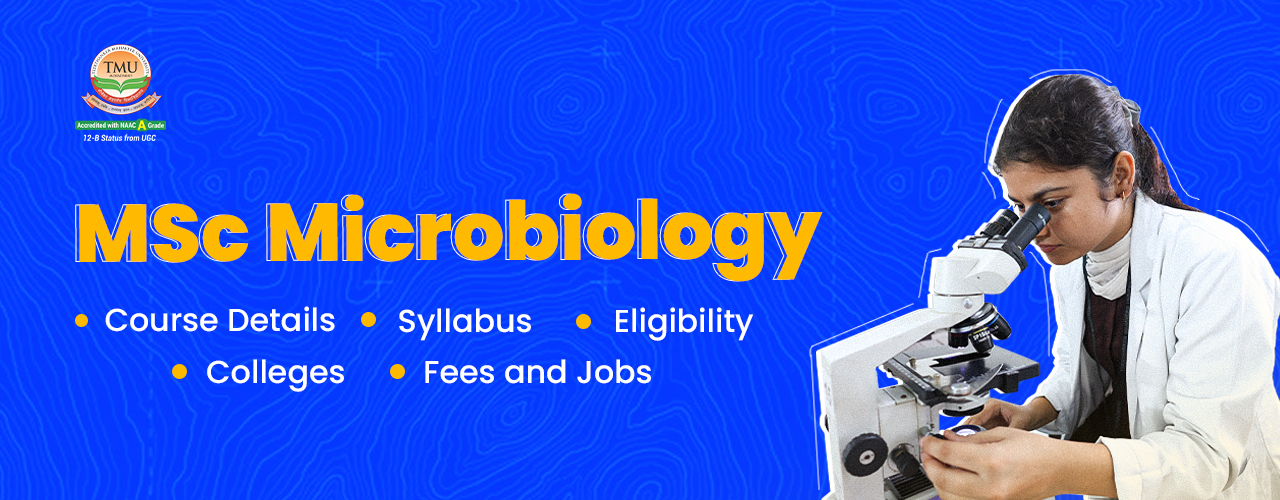MSc Microbiology Course Details, Syllabus, Eligibility, Colleges, Fees and Jobs
Table of Contents
MSc Microbiology full form is a Master of Science in Microbiology, it is a 2 years postgraduate degree program that focuses on the study of microorganisms, such as bacteria, viruses, fungi, and parasites. It provides a deep understanding of these organisms' biology, genetics, and behaviour.
Eligibility criteria for MSc Microbiology requires a Bachelor's Degree: Completion of a Bachelor's degree in Microbiology, Biochemistry, Biotechnology, or a related field is generally required, Minimum Percentage: Most universities have a minimum percentage requirement, usually around 60-70% and Entrance Exams: Some universities may require candidates to appear for entrance exams, such as GATE (Graduate Aptitude Test in Engineering) or university-specific entrance tests.
MSc Microbiology Full Form
MSc Microbiology stands for Master of Science in Microbiology. It is a postgraduate degree program that specializes in the study of microorganisms. It provides a deep understanding of these organisms' biology, genetics, and behaviour.
Teerthanker Mahaveer University
Apply for Admission
Click Here To Apply for Admission
MSc Microbiology Course
MSc Microbiology is a postgraduate program that delves into the intricate world of microorganisms. It provides a comprehensive understanding of the biology, genetics, biochemistry, and applications of these tiny organisms.
The course equips students with advanced knowledge and practical skills to pursue careers in various fields, including research, healthcare, the pharmaceutical industry, food technology, and environmental science.
Key Course Highlights
- In-depth study of microorganisms: Explore bacteria, viruses, fungi, and protozoa in detail.
- Advanced laboratory techniques: Gain hands-on experience with microbial isolation, identification, and analysis.
- Research-oriented curriculum: Conduct research projects and develop critical thinking skills.
- Interdisciplinary approach: Combine knowledge from biology, chemistry, and biochemistry.
- Career opportunities: Open doors to diverse professions in microbiology-related fields.
Course Structure
| Semester | Core Subjects | Elective Subjects |
| Sem 1 | Microbial Physiology, Microbial Genetics, Microbial Biochemistry | Immunology, Virology |
| Sem 2 | Microbial Ecology, Microbial Biotechnology | Food Microbiology, Pharmaceutical Microbiology |
| Sem 3 | Advanced Microbial Techniques, Research Methodology | Environmental Microbiology, Medical Microbiology |
| Sem 4 | Dissertation or Research Project |
Note: The specific course structure and subjects may vary depending on the institution offering the program.
MSc Microbiology Syllabus
MSc Microbiology syllabus is structured to provide both theoretical and practical knowledge in microbiology, with subjects focused on various microorganisms and their applications. While the syllabus may vary slightly across universities, the core subjects remain consistent. Below is an overview of the general syllabus for an MSc in Microbiology:
| Semester | Core Subjects | Elective Subjects |
| 1 | Microbial Physiology | Immunology |
| Microbial Genetics | Virology | |
| Microbial Biochemistry | ||
| 2 | Microbial Ecology | Food Microbiology |
| Microbial Biotechnology | Pharmaceutical Microbiology | |
| Advanced Microbial Techniques | ||
| 3 | Research Methodology | Environmental Microbiology |
| Dissertation or Research Project | Medical Microbiology | |
| 4 | Dissertation or Research Project |
Laboratory Work:
A significant component of an MSc Microbiology program is laboratory work. Students will gain hands-on experience with various techniques, including:
- Microbial isolation and cultivation
- Staining and microscopy
- Biochemical tests
- Molecular biology techniques
- Sterilisation and aseptic techniques
By completing an MSc Microbiology program, students will develop a strong foundation in the field and be well-prepared for careers in research, industry, or academia.
MSc Microbiology Eligibility
The eligibility criteria for an MSc Microbiology program can vary slightly depending on the specific university or institution. However, the general requirements typically include:
Academic Qualifications:
- Bachelor's Degree: A bachelor's degree in microbiology, biology, biochemistry, biotechnology, or a related field is usually required.
- Minimum GPA: Most universities have a minimum GPA requirement, often around 2.5 or higher.
- Relevant Courses: Candidates may be expected to have completed specific undergraduate courses such as microbiology, biochemistry, genetics, and cell biology.
MSc Microbiology Entrance Exams
MSc Microbiology entrance exams are not always mandatory but can play a significant role in the admissions process. The following are some common exams to consider:
Standardized Tests:
- GRE (Graduate Record Examination).
- GMAT (Graduate Management Admission Test).
Subject-Specific Tests:
- MCAT (Medical College Admission Test).
- GATE (Graduate Aptitude Test in Engineering).
| Exam Name | Description |
| GRE (Graduate Record Examination) | A standardized test that assesses verbal, quantitative, and analytical reasoning skills. It is often required for graduate programs in the United States and Canada. |
| GMAT (Graduate Management Admission Test) | While primarily used for business programs, some universities may accept the GMAT for certain science programs, including microbiology. |
| GATE (Graduate Aptitude Test in Engineering) | A national-level examination in India that assesses candidates' understanding of engineering and technology subjects. It may be accepted for certain MSc Microbiology programs in India. |
| MCAT (Medical College Admission Test) | Primarily used for medical school admissions, the MCAT may also be considered for some microbiology programs, especially those with a strong biomedical focus. |
Note: The specific requirements for entrance exams can vary significantly depending on the university or institution offering the MSc Microbiology program. Some universities may not require any entrance exams at all, while others may have specific preferences or combinations of tests.
MSc Microbiology Admission Process
The admission process for an MSc Microbiology program typically involves the following steps:
- Research Universities: Identify universities or institutions that offer MSc Microbiology programs that align with your interests and career goals. Consider factors such as program rankings, faculty expertise, research opportunities, and location.
- Check Eligibility Criteria: Review the specific eligibility requirements for each university, including academic qualifications, entrance exams, English language proficiency, and additional documents.
- Gather Required Documents: Prepare all necessary documents, such as transcripts, entrance exam scores (if applicable), letters of recommendation, statement of purpose, resume or CV, and passport (for international students).
- Submit Application: Complete the online application form for each university you are interested in and submit all required documents. Pay any application fees as specified.
- Entrance Exams (if applicable): If required, register for and take the necessary entrance exams (e.g., GRE, GMAT, GATE, MCAT).
- Interviews (optional): Some universities may conduct interviews as part of the admission process. These can be conducted in person, via video call, or over the phone.
- Wait for Decision: After submitting your application, wait for the university to review your application and notify you of the admission decision.
- Accept or Decline Offer: If you are admitted, decide whether to accept or decline the offer. If you accept, follow the instructions provided by the university to enrol.
MSc Microbiology Colleges in Uttar Pradesh
The colleges in Uttar Pradesh offering the MSc Microbiology programs are listed below. It's recommended to conduct further research and check the latest updates from the official websites of these institutions for the most accurate and up-to-date information.
| College Name | Location | Notable Features |
| University of Lucknow | Lucknow | One of the oldest and most prestigious universities in India, offering a well-established MSc Microbiology program. |
| Central University of Uttar Pradesh | Lucknow | A relatively newer university with a focus on research and innovation, offering a modern curriculum in microbiology. |
| University of Allahabad | Allahabad | Another historic university with a strong academic reputation, offering a variety of postgraduate programs, including microbiology. |
| Dr. B.R. Ambedkar University | Agra | A state university offering a range of postgraduate programs, including microbiology. |
| Teerthanker Mahaveer University (TMU) | Moradabad | A private university with a focus on research and innovation, offering a well-equipped microbiology department and experienced faculty. |
Why Choose TMU for MSc Microbiology
- Experienced Faculty: TMU boasts a team of experienced and qualified faculty members with expertise in various areas of microbiology.
- Modern Infrastructure: The university provides well-equipped laboratories and research facilities to support students' learning and research endeavours.
- Research Opportunities: TMU encourages research activities and offers opportunities for students to participate in research projects under the guidance of experienced faculty.
- Industry Collaborations: The university has collaborations with various industries and research organizations, providing students with exposure to real-world applications of microbiology.
- Affordable Fees: Compared to some other private universities, TMU offers relatively affordable tuition fees.
MSc Microbiology Scope
An MSc in Microbiology offers a wide range of career opportunities in various fields. The scope of this postgraduate program is vast, encompassing research, healthcare, the pharmaceutical industry, food technology, environmental science, and biotechnology. Graduates with an MSc in Microbiology can explore the following career paths:
Research Scientist
- Research microbial processes, genetics, and biochemistry.
- Develop new technologies and products based on microbial applications.
- Contribute to scientific advancements in fields such as medicine, agriculture, and environmental science.
Microbiologist
- Work in laboratories to isolate, identify, and analyze microorganisms.
- Assist in the diagnosis and treatment of infectious diseases.
- Develop new antibiotics, vaccines, and other microbial-based products.
Food Microbiologist
- Ensure food safety and quality by monitoring microbial contamination.
- Develop methods to preserve food and prevent spoilage.
- Contribute to the development of new food products.
Environmental Microbiologist
- Study the role of microorganisms in environmental processes, such as biodegradation and nutrient cycling.
- Develop bioremediation techniques to clean up contaminated sites.
- Contribute to environmental conservation and sustainability.
Pharmaceutical Scientist
- Develop new drugs and pharmaceuticals based on microbial processes.
- Research and develop antibiotics, vaccines, and other therapeutic agents.
- Contribute to the advancement of medical treatments.
Biotechnologist
- Apply microbial processes to produce various products, such as enzymes, biofuels, and pharmaceuticals.
- Work in industries such as biotechnology, agriculture, and pharmaceuticals.
Career Paths for MSc Microbiology Graduates
The salary for an MSc Microbiology graduate can vary significantly depending on several factors, including:
- Experience: Professionals with more experience generally earn higher salaries.
- Location: Salaries can differ based on the geographic location and cost of living.
- Industry: The specific industry in which you work can also impact your salary.
- Employer: The size and reputation of your employer can influence your earning potential.
- Specialization: Your area of specialization within microbiology can also affect your salary.
Here's a general breakdown of potential salary ranges for MSc Microbiology graduates in India:
| Industry | Average Annual Salary (INR) |
| Research Institutions | 3-5 lakhs |
| Pharmaceutical Companies | 4-7 lakhs |
| Healthcare Institutions | 3-6 lakhs |
| Food Industry | 3-5 lakhs |
| Environmental Consulting Firms | 3-5 lakhs |
| Biotechnology Companies | 4-7 lakhs |
Both MSc Microbiology and MSc Biotechnology are postgraduate programs that delve into the world of microorganisms and their applications. While they share some common ground, there are distinct differences in their focus and career paths.
MSc Microbiology
- Focus: Primarily concerned with the study of microorganisms, including bacteria, viruses, fungi, and protozoa.
- Curriculum: Covers topics such as microbial physiology, genetics, biochemistry, ecology, and pathology.
- Career Paths: Research scientist, microbiologist, food microbiologist, environmental microbiologist, pharmaceutical scientist, biotechnologist.
MSc Biotechnology
- Focus: Applies biological processes and organisms to develop products and technologies.
- Curriculum: Covers topics such as molecular biology, genetics, biochemistry, bioinformatics, and bioprocess engineering.
- Career Paths: Biotechnologist, bioprocess engineer, research scientist, pharmaceutical scientist, food scientist, environmental scientist.
Key Differences:
| Feature | MSc Microbiology | MSc Biotechnology |
| Focus | Microorganisms | Applications of biological processes |
| Curriculum | Microbial physiology, genetics, biochemistry, ecology, pathology | Molecular biology, genetics, biochemistry, bioinformatics, bioprocess engineering |
| Career Paths | Research scientist, microbiologist, food microbiologist, environmental microbiologist, pharmaceutical scientist, biotechnologist | Biotechnologist, bioprocess engineer, research scientist, pharmaceutical scientist, food scientist, environmental scientist |
Conclusion
MSc Microbiology offers a comprehensive and rewarding educational experience for individuals interested in the fascinating world of microorganisms. By delving into the biology, genetics, biochemistry, and applications of these tiny organisms, students gain valuable knowledge and skills that can lead to diverse and fulfilling careers.
From research and healthcare to the pharmaceutical industry and environmental science, the scope of microbiology is vast and ever-expanding. By pursuing an MSc in Microbiology, you can contribute to important scientific advancements, address pressing global challenges, and make a positive impact on society.
Frequently Asked Questions
Q1: What is the scope of M.Sc in microbiology?
Ans: An M.Sc. in Microbiology opens doors to research, teaching, pharmaceutical, agricultural, and food science careers. It equips you to delve deeper into microbes and their applications in various fields.
Q2: What is the salary after an M.Sc in microbiology?
Ans: The salary after an M.Sc in Microbiology in India can vary significantly but typically falls within the range of ₹3 lakhs to ₹7 lakhs per annum. This range depends on factors like experience, location, industry, employer, and specialization.
Q3:Is microbiology better than biotechnology?
Ans: The choice between microbiology and biotechnology depends on your specific interests and career goals. Microbiology focuses on microorganisms, while biotechnology applies biological processes for practical purposes. Both fields offer rewarding career paths with diverse opportunities.
Q4: Which subject is best for an M.Sc in microbiology?
Ans: For an M.Sc in Microbiology, subjects like Molecular Biology, Immunology, Genetics, Biotechnology, and Environmental Microbiology are ideal. These areas provide in-depth knowledge on microbial processes, disease mechanisms, and applications in health and industry, offering strong career opportunities in research, healthcare, and biotechnology















